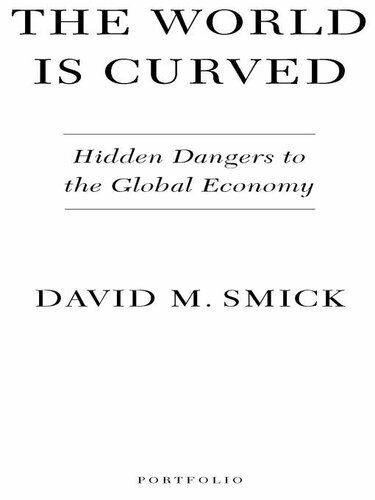
The World Is Curved
Hidden Dangers to the Global Economy
کتاب های مرتبط
- اطلاعات
- نقد و بررسی
- دیدگاه کاربران
نقد و بررسی

September 1, 2008
With this illuminating book, Smick revisits Thomas Friedman's description of the "flat" world produced by globalization, arguing instead that the uncertainty produced by globalized financial markets has created a world that is curved, where events and their consequences are unpredictable. Smick begins with a puzzle: why did the subprime mortgage crisis, an event that directly impacted a relatively small piece of the global market, have such a catastrophic impact on the world market as a whole? From there, the author turns to topics as complex and varied as the potential 21st Century Chinese financial bubble and the policy dilemmas currently facing the Fed. Throughout the book, the author returns to the argument that political trends are increasingly at odds with the forces driving the globalized world economy. Smick brings expertise and lucidity to many difficult subjects, and while his book's appeal will likely be limited to those with some background in the field, it will undoubtedly stir interest and debate amongst investors, policymakers and strategists alike.

October 27, 2008
Confronting the ever-increasing challenges of globalism and the economic problems plaguing the U.S. from a downward spiraling value of the dollar to the subprime mortgage crisis, Smick argues again and again that the solution to the problem is deregulation and encouraging entrepreneurship. While he examines the U.S. in relation to other emerging and potentially powerful markets (China and India, in particular), Smick argues weakly against Thomas Friedman’s more utopian or opportunistic points of view. Jim Bond delivers the book in an accessible and gentle tone. Smick’s prose can be a bit inundating, but Bond balances speed with emphasis to keep listeners’ attention. A Portfolio hardcover (reviewed online).

September 15, 2008
The 200708 subprime financial crisis is the jumping-off point for Smick's (Johnson Smick International) examination of current threats to global prosperity. He explains that although the subprime losses are small in the context of world financial markets, a lack of transparency has diminished investor confidence, dried up financial liquidity, and threatened the very foundations of our world financial system. He says that the growth of global financial markets has made it more difficult for central banks like the U.S. Federal Reserve to intercede effectively in times of crisis. Smick compares the subprime crisis to past events like the UK's forced devaluation of the pound in 1992 and Japan's economic stagnation in the 1990s. He warns of pending dangers like an overheating of the Chinese development juggernaut and the present calls for protectionism by U.S. politicians. He favors a global financial system built on transparency and trust. Smick's role for some 30 years as an economic adviser to central bankers and legislators of all stripes gives him a solid perspective on the global financial system. This summing-up of the subprime debacle and other global financial threats, aimed at general readers, is first rate; highly recommended for all public and academic libraries.Lawrence Maxted, Gannon Univ. Lib., Erie, PA
Copyright 2008 Library Journal, LLC Used with permission.

























دیدگاه کاربران